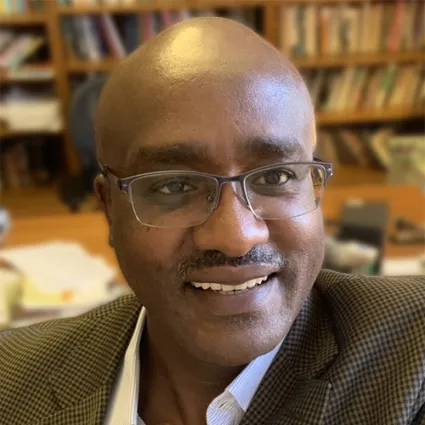Katwiwa Mule
Professor of World Literatures; Department Chair of Africana Studies

Biography
Katwiwa Mule grew up in Kenya, speaking Kikamba, Kiswahili, English; later, during his high school years, he picked up Gikuyu and Kiembu. Like so many African children who grow up in an environment where many languages and cultures coexist, his life experience was a dress rehearsal for comparative study—though he never imagined being a comparatist!
After earning a bachelor of education and master of arts from Kenyatta University in Nairobi and spending two years teaching Swahili language and literature at Egerton University in Kenya, Mule came to the United States and earned a doctorate in comparative literature with a minor in women's studies from Penn State.
Since coming to Smith in 1999, Mule has taught comparative literature courses on postcolonial rewritings of the Tempest, African women's drama, 20th-century literatures of Africa, and gender issues in African women's narratives. Most recently, he has offered courses on the art of translation, South African literature and film, and childhood in the literatures of Africa and the African diaspora.
His research interests include contemporary African women's theater, childhood in African and diasporic literatures, and postcolonial theory and translation. He is also interested in the dialectic between regional and European influences on African narratives, in postcolonial theory, and in African women's perspectives on feminist theory and action.
Selected Publications
Editor, special issue of Metamorphoses: Journal of the Five College Faculty Seminar on Literary Translation (2002) on translation in Sub-Saharan African languages. Author of the introductory article, "Translation, Mistranslation, and Cultural Theory: African Inflections, Challenges, and Prospects."
Women's Spaces, Women's Visions: Politics, Poetics, and Resistance in African Women's Drama (2007), focuses on the ways in which colonial histories, postcolonial politics and the theatrical inventiveness of African female playwrights come together to establish gendered performance spaces that reflect the complexities of African women's realities.
Other selected publications:
- "Intertextual Moments, Contested Meanings: Kitula King'ei's Adaptation and Rewriting of Utebdi wa Mwana Kupona," Forthcoming, Research in African Literatures, 2023
- "Rereading East African Literature Through a Human Rights Lens: The Example of Ngugi wa Thiong'o's Weep Not, Child," in a Companion to African Literatures, London: Blackwell, 2021
- "Gendered Violence and Narrative Erasure: Women in Athol Fugard's Tsotsi and Gavin Hood's Tsotsi" in Gendered Violence and Human Rights in Black World Literature and Film, New York, Routledge, 2021
- "Contradictory Habitations: Gender, Agency, and Empowerment in Fatima Dike's The Sacrifice of Kreli," Pula: Botswana Journal of African Studies (2012)
- "Whose Language? Whose Literature? Whose nation? Ngugi wa Thiong'o and the Politics of Language in African Literature," in Mapping Africa in the English Speaking World, England: Cambridge Scholars Publishing, 2010
- "Blurred Genres, Blended Memories" Engendering Dissidence in Nawal el Saadawi's Memoirs of a Woman Doctor and Tsitsi Dangarembga's Nervous Conditions, in Meridians: feminism, race, transnationalism (2006).
- "Four Swahili Women Playwrights and a Critique of Development," in Kiswahili: Journal of the Kiswahili Research Institute (2005).
- "Oral Performance and the Creative Imagination in Penina Muhando's Nguzo Mama," in a special issue of Folklore Forum: Folklore and Instruction in Africa (1997).
- "Negotiating Between Tomb and Womb: Mariama Bâ's So Long a Letter" in Contemporary Literature in the African Diaspora (1997).
Office Hours
Fall 2024
Monday and Wednesday 3-4 p.m.
and by appointment